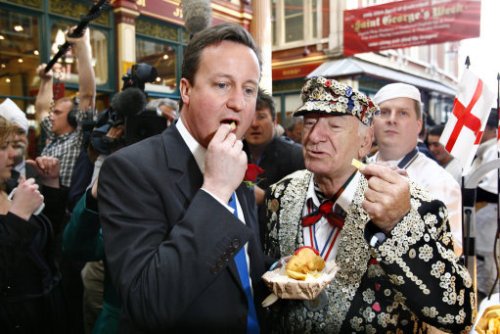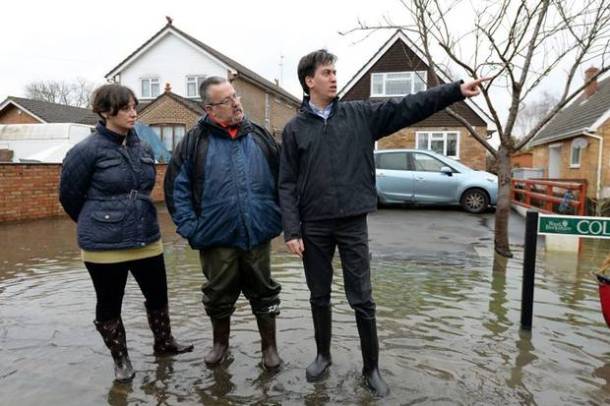UKIP are on the march, seeing a surge in support in the local government elections and getting the most number of seats in the European elections.
It would be easy to see this as representing a sea change in British politics. And because it’s the line of least resistance, that is what the political pundits have done. Labour won 44% of the council seats, the Tories 36%. They apparently need to ‘learn lessons’ from UKIP who didn’t quite win 4%, who have no chance of winning a single seat at the general election next year, and whose share of the vote actually fell.
UKIP is an optical illusion, a mirage. Once you work out where those votes came from, the prevailing narrative on UKIP collapses.
So what’s the prevailing narrative?
Here’s the change from last time in the European Parliament elections:
UKIP have increased their share by 11%
Labour are up 10%
The Conservatives are down 4%
The LibDems are down 7%
The BNP is down 5%
Various parties called things like Christian Coalition Against the EU are down 3%
The prevailing narrative goes something like ‘there’s a new force on the right of British politics’, and that because the Conservatives are a right wing party, you can account for the UKIP gains adding up some Tory defectors from the extreme right, the BNP and the anti EU parties’ tallies together. The Tories can ‘only win’ if they throw their lot in with this right wing coalition that represents a neglected constituency of voters.
OK. Now explain where Labour’s votes came from.
No.
The first mistake is that politicians and journalists of all political persuasions believe that there’s a silent majority of ‘traditional’ British people. Call them ‘Daily Mail People’, after the newspaper. (For any Americans in need of translation, think of the Daily Mail as a print version of Fox News, but with lots of pictures of Hermione Granger because their readers like whacking off to those). The Daily Mail People aren’t of a particular social class – there are working class gorblimey Cockneys in there and there are Home Counties ladies who you’d get Penelope Keith to play. What unites them is that they are white, greying, monitor their house price in real time, they didn’t go to university but their kids do and they attribute this to it being easier to get into university nowadays. They are aspirational, status obsessed, puritanical. They are, in a polite way, ragingly racist, sexist, homophobic and xenophobic.
For politicians and media types, Daily Mail is rhyming slang for ‘holy grail’.
For a very long time, the belief has been that the Daily Mail People are the secret to winning elections, but it’s all very mysterious, because … well, no politician or journalist has ever actually met a Daily Mail Person. The BBC understands that they’re particularly bad at knowing anyone like that because there aren’t any in London. But on the occasions they venture to, say, the North, Scotland, the East, Wales, the South, Ireland or the West, they never find any in those places, either. They must be very good at hiding, the logic goes. Lots of people, after all, watch Top Gear.
But UKIP, it’s reckoned, have somehow not only found them, they’ve worked out a way to get the Daily Mail People voting, they talk their language. They have activated the Daily Mail sleeper agents and British politics will never be the same again.
The defining issue of a Daily Mail Person, we are told, is ‘immigration’ and the ‘political class’, they say, ‘just don’t get it’. The political, media and academic class think in terms of a global economy. We live in a world where there’s free movement of capital and free trade but not free movement of labour. The rich and the transnational can hire workers where it’s cheap, sell goods where they’re expensive and put the proceeds where they don’t have to pay tax. The ‘elite’ think of ‘Immigration’ as something a bit old fashioned, like the gold standard, coal scuttles or paying for the music you listen to. Immigration isn’t actually even a thing. You can’t, to paraphrase Douglas Adams, migrate into or out of a globalised economy.
But when ‘traditional’ British people say ‘immigration’, the story goes, they mean foreigners coming over here and stealing our stuff. Everything from our job down the market to our ability to weigh our potatoes in pounds and ounces. It directly affects their lives, all the time.
And this belief is meant to be a right wing shibboleth in the UK the same way abortion is the US. There are, the theory goes, a huge number of British people obsessed with immigration and the mainstream parties don’t understand that, and need to tack to the right. Anti immigration parties will always blindside ‘mainstream politics’ because we’re all liberals who can only respond to Daily Mail People by constantly underestimating, ignoring or demeaning them.
Well, OK. The reason no one’s ever met these people is because they don’t exist, or at least not in any great number. But humour the theory for a moment. If there were twenty million Daily Mail People, should the political class act accordingly?
No.
There are people who’ve said that much of the UKIP vote this time was because the Cameron government made gay marriage legal. Is this a good theory? Probably not. The same people making this argument also blamed the rain this winter on gay marriage. The fact our politics can usually ignore such … let’s call them “extroverted irrationals” … is a feature, not a bug. There is racism, sexism and homophobia in Britain, but the reason we don’t usually see it reflected in our politicians, at least not publicly, is because the system works, not because it doesn’t. We’re a representative democracy. We don’t elect people to pander to our whims, we elect people we think are knowledgeable and have sound judgement.
We’re all basically idiots. That is to say that even the smartest amongst us have only limited knowledge.
But so what?
Can you hold the view that something should be done to get those Nigerian girls back with no real clue who took them, why they were taken and only a vague sense of where Nigeria is? Of course you can. Who is the moral idiot in the following conversation: ‘Someone kidnapped three hundred teenage girls from a school and they’re being forced into marriages – by which I mean raped. We should help those girls.’ / ‘Not unless you can point to where it’s happening on a map’.
What we want is a political structure that goes ‘right … here’s what’s happening, here are our options, and this is what we’ll do’. Not just in the case of the Nigerian girls, but generally. And the way you get to that form of government is not, I humbly suggest, by putting people in charge who think raining happens because it’s raining men, halleluiah. Does that sound patrician and insulting? Boo hoo. One of the most important functions of a democracy, one of the prime advantages it has over other systems, is that it insulates against idiocy.
So … OK, if UKIP isn’t a grand alliance of Daily Mail People, then what’s going on?
It’s important to note I’m talking about broad trends. Will some people have switched votes from Labour to Conservative, Conservative to Green, Green to BNP? Sure. But if we’re looking for a narrative, we have to smooth things out a little. I’m going to suggest the prevailing narrative of Daily Mail People finally having a voice doesn’t work, and there’s a much better explanation.
First of all, let’s look at the BNP number. They’re down 5%, let joy be unbounded, but … wait, that means in 2009 they were up to 6%. Yikes.
The Daily Mail Person model would suggest they’ve gone to UKIP. Because the BNP’s right wing and UKIP’s right wing and the BNP went down and UKIP went up.
No. The 2009 BNP vote was a protest against Gordon Brown’s government. There is no need to protest the Gordon Brown government in 2014. It’s far more plausible to think those votes didn’t go to UKIP in 2014, they went back to Labour. Because that’s what one type of protest voters do. They are loyal to one party, but occasionally want to register their disapproval. And we know this is what actually happened because if the BNP people last time voted UKIP this time … well, they also all moved house and were replaced by Labour voters. The new UKIP votes didn’t come from the BNP areas.
So where did UKIP get their new supporters?
1. Tories making a protest vote, just as Labour supporters did five years ago with the BNP. Survey after survey has around half of UKIP voters saying they voted Tory in the last election and probably will at the next one. And straight away, that’s the killshot for the ‘realignment of British politics’ story. Most of UKIP’s votes come from Tories registering disapproval, and most of them will just vote Tory when the general election comes.
2. The LibDems always attracted votes from people who didn’t want to vote for either Labour or the Conservatives. A longer term protest vote, not a one time deal. LibDem support has collapsed, surely, simply because you can’t protest vote by voting for a party of government. The realignment in UK politics may be that UKIP now get all the ‘a plague on both their houses’ votes. Except without the regional pockets that actually generate any seats.
3. About 3% last time voted for parties called things like The Christian Popular People’s Front Against the EU and the People’s Popular Front For Anti-EU Stuff. UKIP do seem to have soaked up those.
People are not voting ‘for UKIP’, at least not in any great numbers. They are benefiting from being a go to vote for both disaffected Tories and people who used to vote LibDem as a way of voting ‘Neither’.
Why are people disaffected with UK politics? It’s not ‘immigration’. It’s that the party leaders of the two electable parties look like this:
And this:
No, seriously. The next Prime Minister is one of these two people. It suits the Conservative and Labour Parties to portray this as a Manichean struggle between ‘the mainstream’ and the extreme right. This isn’t about anything as grand and ‘good and evil’ as ‘fighting racism’. Nigel Farage just beat Labour and the Tories in a national election. He is patently a useless wanker. The unpalatable truth that the ‘mainstream politicians’ don’t want to face up to is that they’re even more useless than that. This is not them being outflanked by the great forces of history … this is them being trounced by … this:
We’re at a weird point. The Labour Party were in power a long time, they wore out their front bench. All the good potential leaders are too old, have retired, died or just burned out. The Tories aren’t much better – the 1997 result wiped out a lot of people who might have led the party and made it an entirely pointless prospect for the ambitious, so they had to start from scratch from a tiny talent pool.
So we’re at a point where the two main parties are in a post-Apocalyptic, rump state simultaneously. And a point of economic slump and no plan to get out of it. And at a point where there are vast problems facing the world like climate change and resource bottlenecks that are simply beyond the ability of a nation state to fix. Not old problems like a dictator or nationalist movement, but actual planetary level emergencies that no amount of diplomacy or tank divisions will solve. We used to worry we’d run out of oil, then that we’d drown as the seas rose, but hey, no problem, we’ll run out of drinking water long before that.
Most horrific ‘we’re screwed’ fact I’ve heard? Thanks to a combination of an increase in container freight and overfishing, the weight of all the ships on the ocean is now greater than the weight of all the fish in those oceans. Congratulations, we killed a planet.
What’s the solution? Let’s check Labour’s answer. Oh. It’s ‘Ed Miliband’.
It does give you the sense that perhaps they aren’t asking the same question. The same category of question, even. The same kingdom of question. That the problem is not so much that Ed Miliband is ‘weird’ but that his entire party lives in a parallel universe, one where, presumably, both the problems and sandwiches are smaller.
We, all of us, everyone living on this planet have the sense that what we have isn’t working. That there’s some solution involving, y’know, grassroots organisation rather than massive bureaucracy (but with a massive bureaucracy to protect us), more efficient use of energy, making things instead of selling financial products to each other, the rich people not being quite so rich and the poor people not starving to death.
The solution is not UKIP, UKIP is a symptom. And ‘immigration’ is not a problem, it’s a symptom of the fact we genuinely do live in a world where some of the most important resources are dwindling fast. We all, I think, have the sense that building big walls around things, metaphorically and literally, is a terrible idea but might be the best plan we’ve got.
The Labour Party and the Conservatives do not need to become cretinotropic to mop up a few percentage points from UKIP with the aim of becoming the largest party in a hung parliament. This is a representative democracy, this is a time where we’re not actually in crisis but are staring at it, and that means we need leaders who behave like the best of us, on our best days. There is much to love about Britain, but there are also serious problems that need serious solutions.
UKIP is clearly not a serious anything. But it’s going to be much easier for Miliband’s team to arrange a photo op where he’s drinking a pint like a regular human from our dimension, and for Cameron to pledge a referendum to deport Great Uncle Bulgaria than it is to start acting on the big, difficult stuff. ‘You voted for UKIP, we listened’. But people didn’t vote for UKIP, UKIP was just a handy place for a diverse set of protest votes to converge. All we voters want, I think, is a leader who’s not a wanker who seems vaguely engaged with an effort to make the future somewhere worth living in for most, if not all, people. This is not a high bar. There are huge, possibly intractable problems facing the twenty-first century and we’re at the point where any baby born in the UK from now on can reasonably expect to see the twenty-second century. We need politicians who are thinking further ahead than next May. We’re not saying we expect someone to solve things overnight by waving a magic wand, we’re saying we know we can’t, so we need to make a start now. So, please, stop obsessing about UKIP and get to work. Ignore UKIP, ignore UKIP hard. There is no such thing as UKIP.










